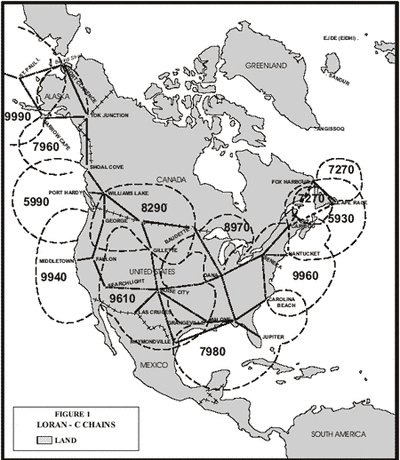System De-Activated As A Cost-Saving Measure
 The Coast Guard published a Federal Register notice last week
regarding its intention to terminate transmission of the LORAN-C
signal February 8, 2010. A LORAN Programmatic Environmental Impact
Statement Record of Decision stating that the environmentally
preferred alternative is to decommission the LORAN-C Program and
terminate the North American LORAN-C signal was published in the
Federal Register on January 7, 2010.
The Coast Guard published a Federal Register notice last week
regarding its intention to terminate transmission of the LORAN-C
signal February 8, 2010. A LORAN Programmatic Environmental Impact
Statement Record of Decision stating that the environmentally
preferred alternative is to decommission the LORAN-C Program and
terminate the North American LORAN-C signal was published in the
Federal Register on January 7, 2010.
The Homeland Security Appropriations Act for Fiscal Year 2010
allowed for termination of the LORAN-C signal on January 4, 2010,
after certification from the Commandant of the Coast Guard that it
was not needed for maritime navigation and from the Secretary of
DHS that it is not needed as a backup for GPS.
In accordance with the DHS Appropriations Act, the U.S. Coast
Guard will terminate the transmission of all U.S. LORAN-C signals
effective 2000Z 08 Feb 2010. At that time, the U.S. LORAN-C signal
will be unusable and permanently discontinued. This termination
does not affect U.S. participation in the Russian American or
Canadian LORAN-C chains. U.S. participation in these chains will
continue in accordance with international agreements. The Canadian
Coast Guard has also issued a statement, which is shown on their
website.
The Coast Guard strongly urges those currently using LORAN-C for
navigation to shift to a GPS navigation system and become familiar
with its operation as soon as possible.
LORAN-C was originally developed to provide radionavigation
service for U.S. coastal waters & was later expanded to include
complete coverage of the continental U.S. as well as most of
Alaska. Twenty-four U.S. LORAN-C stations work in partnership with
Canadian and Russian stations to provide coverage in Canadian
waters and in the Bering Sea. They system provides better than 0.25
nautical mile absolute accuracy for suitably equipped users within
the published areas. and provides navigation, location, and timing
services for both civil and military air, land and marine users. It
is approved as an en route supplemental air navigation system for
both Instrument Flight Rule (IFR) and Visual Flight Rule (VFR)
operations. The LORAN-C system serves the 48 continental states,
their coastal areas, and parts of Alaska. Dedicated Coast Guard men
and women have done an excellent job running and maintaining the
LORAN-C signal for 52 years.

LORAN-C has, as a result of technological advancements in the
last 20 years, became an antiquated system no longer required by
the armed forces, the transportation sector or the nation’s
security interests and is used only by a small percentage of the
population. The Coast Guard understands that LORAN-C is still used
by a small segment of the public and that those users will have to
shift to GPS or other systems; however, continued use of limited
resources to operate LORAN-C is no longer prudent use of taxpayer
funds and is not allowed under the 2010 DHS Appropriation Act.
The Coast Guard has enjoyed a long and close relationship with
the many communities located near LORAN-C facilities and we value
those relationships. The Coast Guard will continue to honor those
relationships by working to minimize any adverse impacts to
communities caused by site closures.
The decision to cease transmission of the LORAN-C signal
reflects the president’s pledge to eliminate unnecessary
federal programs.
 Airborne 04.16.24: RV Update, Affordable Flying Expo, Diamond Lil
Airborne 04.16.24: RV Update, Affordable Flying Expo, Diamond Lil ANN's Daily Aero-Term (04.20.24): Light Gun
ANN's Daily Aero-Term (04.20.24): Light Gun Aero-News: Quote of the Day (04.20.24)
Aero-News: Quote of the Day (04.20.24) Aero-News: Quote of the Day (04.21.24)
Aero-News: Quote of the Day (04.21.24) ANN's Daily Aero-Term (04.21.24): Aircraft Conflict
ANN's Daily Aero-Term (04.21.24): Aircraft Conflict




